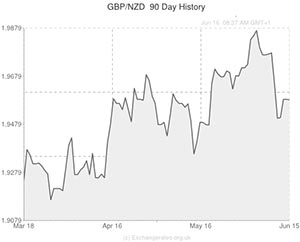
As European trading opened on Monday the Pound to New Zealand Dollar exchange rate was down by 0.10 per cent in spite of the Pound’s buoyancy against its other main currency counterparts.
Several factors are contributing to keeping the Pound buoyant, including last week’s comments from Bank of England Governor Mark Carney, speculation that an interest rate increase could occur in November, and Standard & Poor’s decision to upwardly revise its outlook for the UK from negative to stable.
However, while the Pound was able to achieve highs against several of its peers (including a 19-month high against the Euro and an almost five-year high against the US Dollar) it struggled against its New Zealand rival.
Last week the ‘Kiwi’ surged in response to the Reserve Bank of New Zealand’s decision to increase interest rates for the third time in four months. The tense situations in Iraq and Ukraine have since taken some of the shine off the South Pacific asset, but it is still performing comparatively well.
The GBP to NZD exchange rate was slightly softer despite several economic reports for New Zealand coming in below forecast levels.
The nation’s Westpac consumer confidence report for the second quarter came in at 121.2 in the second quarter, down from 121.7 in the first.
Similarly, New Zealand’s performance of services index slid from a negatively revised 58.5 to 54.2 in May, still holding above the 50 mark separating growth from contraction but a moderately disappointing result.
According to Business New Zealand, who compiled the data; ‘We think a big lift in construction activity in Thursday’s national accounts will be complemented by a decent expansion in the service sector. The very strong positive trends that have been obvious in building consents for some time are now finally showing up in actual construction activity.’
Meanwhile New Zealand’s REINZ house price index showed a month-on-month decline of 1.2 per cent in May, following on from a 0.1 per cent increase the previous month.
On the year the house price index was down by 14.8 per cent.
Conversely, the UK’s Rightmove house price measure showed a monthly increase of 0.1 per cent in June and an annual jump of 7.7 per cent.
However, while the GBP/NZD exchange rate held modest declines during the European session, there are some industry experts who believe that ‘Kiwi’ weakness is on the horizon. Investors have been turning to lower-risk assets in the face of the escalating tensions in Iraq and if the situation worsens over the next few days the New Zealand Dollar could tumble.
In the view of industry expert Martin Rudings; ‘The market is already long on New Zealand Dollars so it’ll be like a fire in a cinema, the first one out the door or a rush for the exit, so I am a wee bit wary, and I certainly wouldn’t be buying Kiwi Dollars up at these levels with what’s going on.’
That being said, the New Zealand could be supported if this week’s domestic gross domestic product report shows that the economy posted expansion of 1.2 per cent in the first quarter of 2014.
New Zealand Dollar (NZD) Exchange Rates
[table width=”100%” colwidth=”50|50|50|50|50″ colalign=”left|left|left|left|left”]
Currency, ,Currency,Rate ,
New Zealand Dollar, ,US Dollar,0.8672,
,US Dollar,0.8672,
New Zealand Dollar, ,Euro,0.6410,
,Euro,0.6410,
New Zealand Dollar, ,Australian Dollar,0.9241,
,Australian Dollar,0.9241,
New Zealand Dollar, ,Pound Sterling,0.5108,
,Pound Sterling,0.5108,
US Dollar, ,New Zealand Dollar,1.1529,
,New Zealand Dollar,1.1529,
Euro, ,New Zealand Dollar,1.5594,
,New Zealand Dollar,1.5594,
Australian Dollar, ,New Zealand Dollar,1.0822,
,New Zealand Dollar,1.0822,
Pound Sterling, ,New Zealand Dollar, 1.9581,
,New Zealand Dollar, 1.9581,
[/table]

Comments are closed.